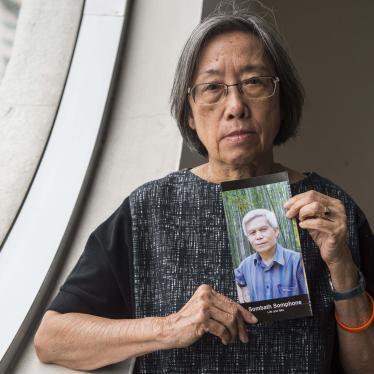(New York) – Chinese courts in Guangdong and Sichuan provinces on March 31, 2017, convicted three activists on politically motivated charges that the authorities should quash, Human Rights Watch said today.
The Foshan Intermediate People’s Court in Guangdong, in separate trials, convicted women’s rights activist, Su Changlan, 45, and an online political commentator, Chen Qitang, 57, for “inciting subversion of state power” and sentenced them to prison terms of three years and four-and-a-half years, respectively. The Wuhou District People’s Court in Chengdu, Sichuan’s capital, convicted Chen Yunfei, 49, an artist who is not related to Chen Qitang, for “picking quarrels and provoking trouble” and sentenced him to four years in prison.
“Jailing activists for supporting democracy in Hong Kong or commemorating the Tiananmen massacre shows just how nervous the Chinese government is about those promoting respect for rights,” said Sophie Richardson, China director. “The government should be freeing these and other imprisoned activists, not punishing them.”
The Foshan court alleged that Su and Chen Qitang published and shared “defamatory” articles on the internet “attacking socialism” and “inciting subversion.” One of the articles cited in Su’s verdict was titled “Su Changlan: calling for attention on disappeared rights activist – Ma Shengfen.” A purportedly incriminating essay Chen Qitang shared was a proposal to call for an overseas Chinese political consultative conference. While there were no mentions in Su and Chen Qitang’s verdicts of their support for the 2014 protests in Hong Kong, their detentions were a result of their activism, including supporting the protests, according to their lawyer Liu Xiaoyuan.
The conviction of Chen Yunfei related to tweets critical of the Chinese government and his various performance art projects, including one in which Chen Yunfei called the police to report an “illegal gathering,” which turned out to be a government conference. Police had detained Chen Yunfei in March 2015, after he organized a memorial service for victims of the 1989 Tiananmen massacre.
Jailing activists for supporting democracy in Hong Kong or commemorating the Tiananmen massacre shows just how nervous the Chinese government is about those promoting respect for rights
Sophie Richardson
China Director
The prosecutions of the three activists were marred by multiple procedural violations and irregularities. The authorities denied the three access to their lawyers, subjected them to secret and prolonged pretrial detention, and denied Su adequate medical care.
Foshan police detained Su and Chen Qitang in October 2014, after they posted online messages supporting the pro-democracy Umbrella Movement in Hong Kong. The police held Su incommunicado for over six months, while also detaining her husband and brother for nearly a month for protesting her secret detention. The police held Chen Qitang, a friend of Su’s, in administrative detention for 10 days, then released him. But they took him into custody again on November 25, 2014. Chen was also not allowed to meet with his lawyer until June 2015.
After over a year in police custody, both were indicted in late 2015 for “inciting subversion of state power” and tried in April 2016. The Foshan court waited nearly a year as they remained in detention before announcing the verdicts.
Su suffers from hyperthyroidism, heart arrhythmia, and tremors, and has been hospitalized several times during her detention. Authorities have denied multiple requests by Su’s lawyer for bail on medical grounds.
After Chen Yunfei spent over a year in police custody, court officials scheduled his trial for July 6, 2016, but at the last minute postponed it until December. Many people had shown up outside the courthouse to support him.
Su, a former elementary school teacher, became involved in human rights activism after local authorities seized her land in Sanshan village, in Foshan, in 2005. She went to Beijing to petition, taught herself law, and later began to help other women seek land rights protection. Over the years, Su has campaigned for improving the government’s response to other women’s rights issues, including domestic violence, sex trafficking, and sexual assault, and provided legal advice to victims in those cases.
Chen Qitang is a former editor for various Chinese websites on which he published numerous essays critical of government policies. Chen served two-and-a-half years in prison from 2007 to 2009, on fraud charges over his activities assisting farmers in Foshan to seek redress for seized land.
Chen Yunfei participated in the 1989 democracy movement as a university student in Beijing. He had campaigned to demand that authorities investigate the killings during the Tiananmen crackdown and compensate families of the victims. Chen was placed under house arrest for six months in 2007, after taking out an advertisement in a local newspaper commemorating the victims.
Since President Xi Jinping assumed power in March 2013, his government has stepped up its hostility toward peaceful dissent, freedoms of expression and religion, and the rule of law. Many peaceful critics of the government remain locked away, including the Nobel Peace Laureate Liu Xiaobo and the Uyghur economist Ilham Tohti. Sixteen of the human rights lawyers and supporters among the 300 detained during a nationwide raid in July 2015 are still facing trial; two have been handed harsh sentences.
“Su Changlan, Chen Qitang, and Chen Yunfei should be held up as role models for helping others seek justice,” Richardson said. “While President Xi positions himself as a global leader, his relentless crackdown on activists and rights defenders demonstrates his lack of confidence in China’s political system.”








